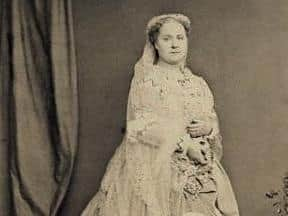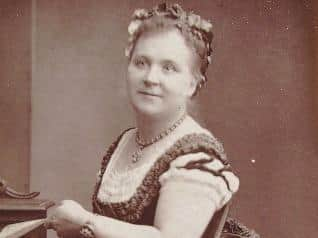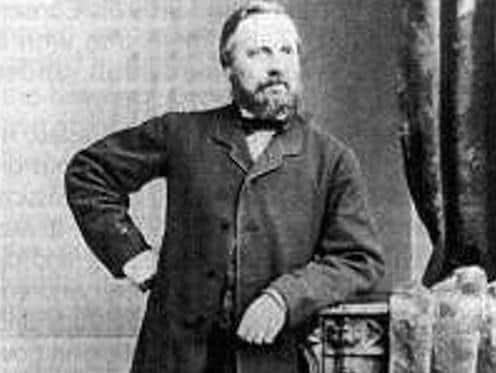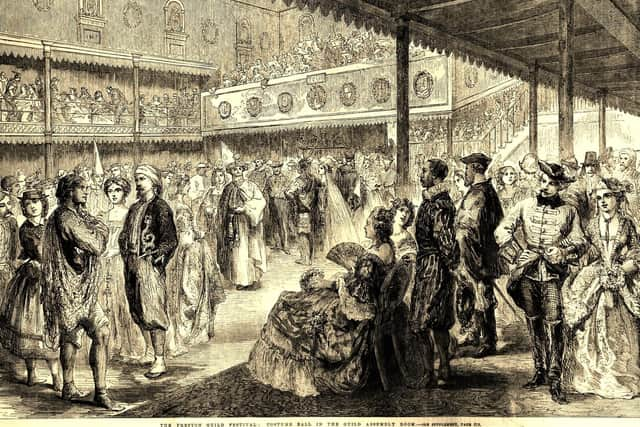Forgotten Preston superstar who wowed Europe
and live on Freeview channel 276
The name of Madame Helen Lemmens-Sherrington has been lost in time in Preston the city of her birth, yet 150 years ago she was not only the talk of the town, but throughout the capital cities of Europe.
Her mother, before she married John Sherrington a son of a Preston cotton manufacturer, was Miss Grace Johnson, daughter of Preston’s first recorded letter delivery John Johnson.
Advertisement
Hide AdAdvertisement
Hide AdHis postal duties started in 1817 when it was payment on delivery, and the carrier paid the postmistress for letters before commencing on his round.


He had to collect his fees from those receiving the letters and, if they lived outside the borough boundaries, a surcharge of an extra penny was made.
As the Preston postal services developed he enlisted the help of his two sons, Josiah and Mark to cope with increased work load. Grace Johnson became recognised as a talented singer and was a member of the Preston ‘Catch And Glee Club’ which thrived from the 1830s.
She was certainly popular in Lancashire and as Mrs Sherrington she often topped the bill at the old Corn Exchange and a typical review of her performance there read: ‘Her talents are duly appreciated; she is an amiable lady and a charming singer who delights those who appreciate music.’
Advertisement
Hide AdAdvertisement
Hide AdAlong with her husband, who was also gifted musically, she was a member of the St Wilfrid’s Choir.


Helen was born in 1834 and while still a youngster her family moved to Rotterdam where her mother, realising her daughter was also blessed with a singing voice, arranged appropriate tuition.
The young Miss Lemmens was enrolled in a musical society, for whom she sang aged just 14 the principal soprano part of Haydn’s ‘Creation’ with such success that it was resolved that she should be trained with a view to embracing a career as a vocalist.
To that end she was sent to the Conservatoire of Brussels where her talent was soon appreciated and nurtured. Her talented blossomed and in 1856 she made her first appearance in London.
Advertisement
Hide AdAdvertisement
Hide AdAt that time Monsieur Jacques Nicholas Lemmens, a famous organist and composer, was a professor at the Conservatoire and had been made ‘Chevalier of the Order of the Red Eagle’ for his services to the art of music in Belgium. Eventually their love of music developed into romance and they were married in 1857.


Madam Lemmens-Sherrington made her stage debut in 1860 in the new opera ‘Robin Hood’ at Her Majesty’s Theatre in the Haymarket, London playing the part of Maid Marian in a highly successful production.
She was in big demand from this time onwards, but clearly had not forgotten her roots returning to the Theatre Royal in Preston in December 1860 to earn rapturous applause with a selection of songs from the Robin Hood opera.
Invited by the Guild Mayor Robert Townley Parker to appear at the Corn Exchange at the Preston Guild of 1862 she was one of the principles as an oratorio of ‘Elijah’ was performed and a further performance with the great Charles Halle on the piano earning her a fee of 100 guineas and the pianist a fee of 150 guineas.
Advertisement
Hide AdAdvertisement
Hide AdIn January 1863 she was back in Preston again, on that occasion she gave two performances at St Wilfrid’s church in aid of the Catholic Poor a charity close to her heart in those cotton famine days.


In 1867, as Preston celebrated the opening of the new Town Hall and the public parks, she was engaged to perform in an evening concert at the new venue before Edmund Birley the Mayor of Preston, HRH the Duke of Cambridge and civic dignitaries aplenty.
Her performance was said to have been beyond all praise and exceeded anything ever heard in Preston before. Her rendition of the National Anthem in which she sang alternative verses with the choir of the Preston Parish Church being something to behold.
A couple of seasons followed at the Royal English Opera at Covent Gardens and following that her career was principally on the concert platform often sharing duets with leading vocalists of the time.
Advertisement
Hide AdAdvertisement
Hide AdIn 1871 she went on an extensive tour with her husband and the notable French baritone Jules Lefort and her skills were recognised by the Royal Philharmonic Society who awarded her a gold medal.
Such was the appreciation of her vocal quality that she was later in the decade, along with her husband, one of the first to have her voice recorded. Unfortunately, her husband died in January 1881 in Belgium leaving behind his widow and their two sons and two daughters.
Her daughter Jose Sherrington was by this time becoming a popular singer and on a visit to the Exchange Hall in Blackburn in 1885 her performance was likened to those of her mother Helen.
Although appointed as a professor of singing at the Brussels Conservatoire after her husband’s death, Madame Lemmens combined her teaching there, with frequent visits to England and teaching at the Royal Manchester College of Music and the occasional concert appearance at venues such as the Royal Albert Hall.
Advertisement
Hide AdAdvertisement
Hide AdSuch was her standing in Manchester that she was often asked to judge the suitability of students wishing to enrol in the Royal Manchester College of Music along with Sir Charles Halle.
In 1894 she came out of retirement to sing for the last time in public her ever popular Hayden’s ‘Creation’. The Manchester Guardian commenting: ‘Though the voice was not as rich and powerful as two decades earlier, she displayed the vocalist’s skill of a true artist in everything she sang.’
She was to spend her later years in retirement mainly in Belgium and her death, aged 72, at her Brussels residence was announced in May 1906.
A distinguished vocalist she received much praise for the pleasure she had given to so many and for her selfless devotion to the training of the next generation of opera singers. As a descendant of the first postman of Preston she certainly knew how to deliver on stage.